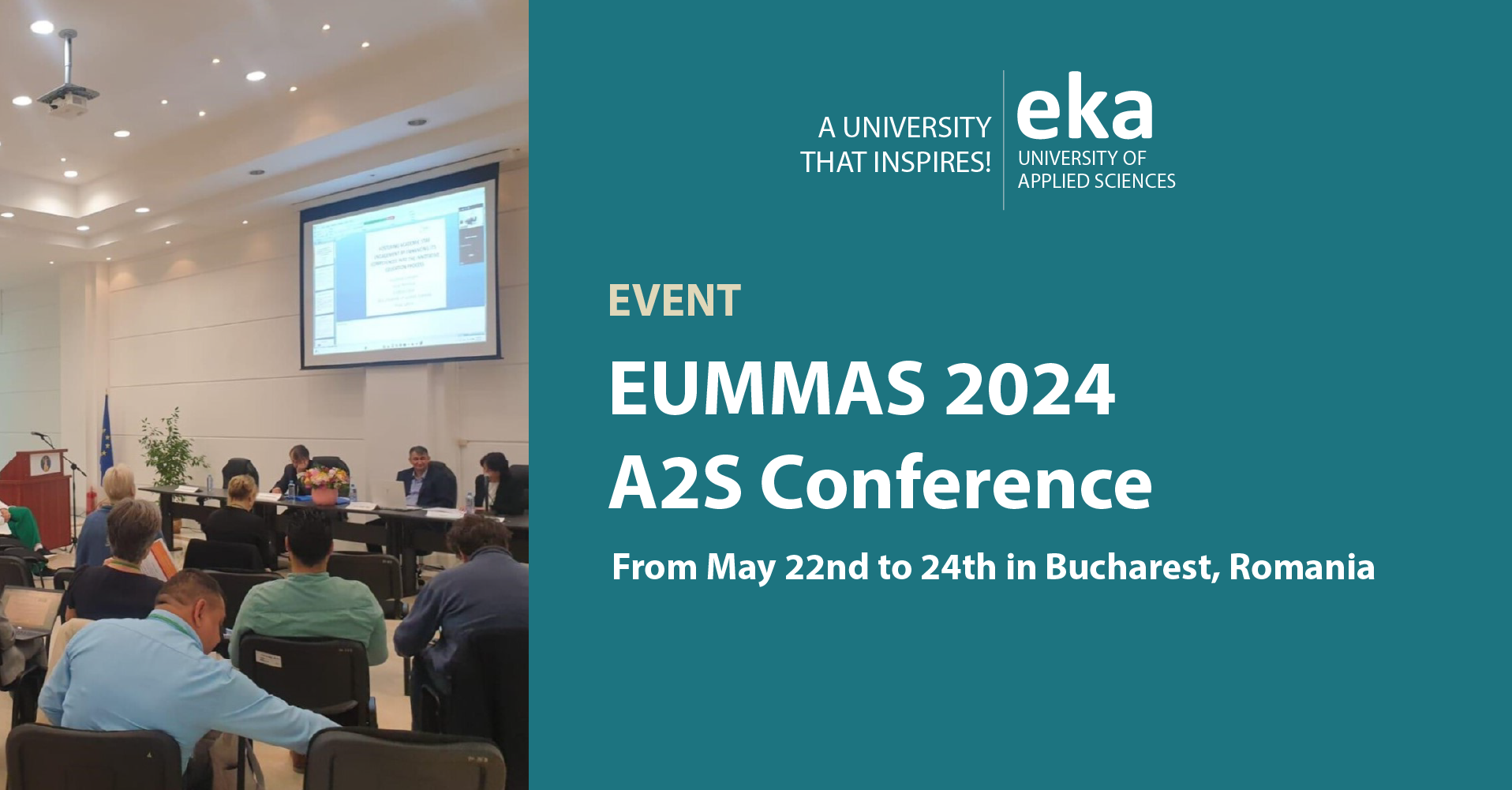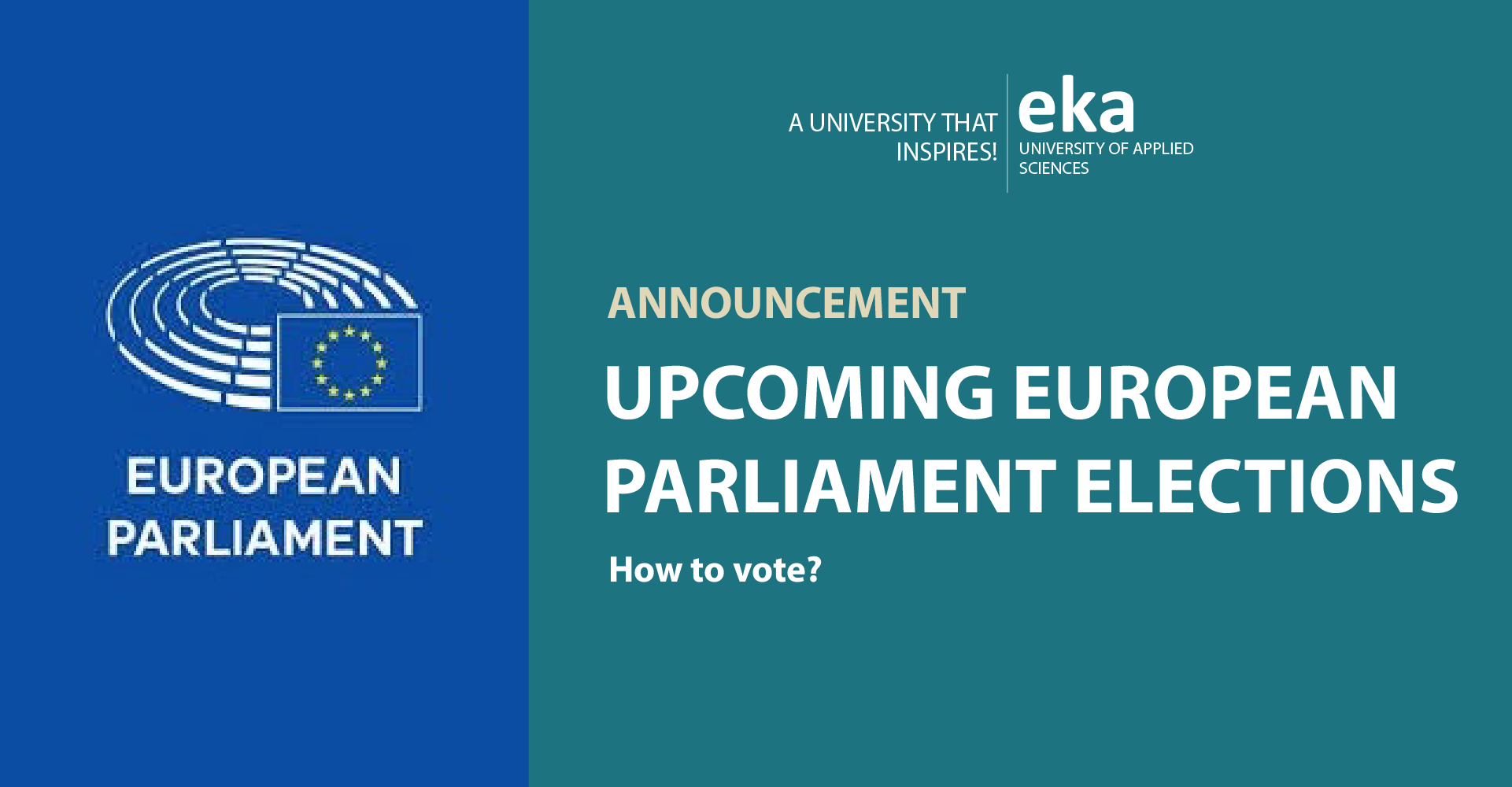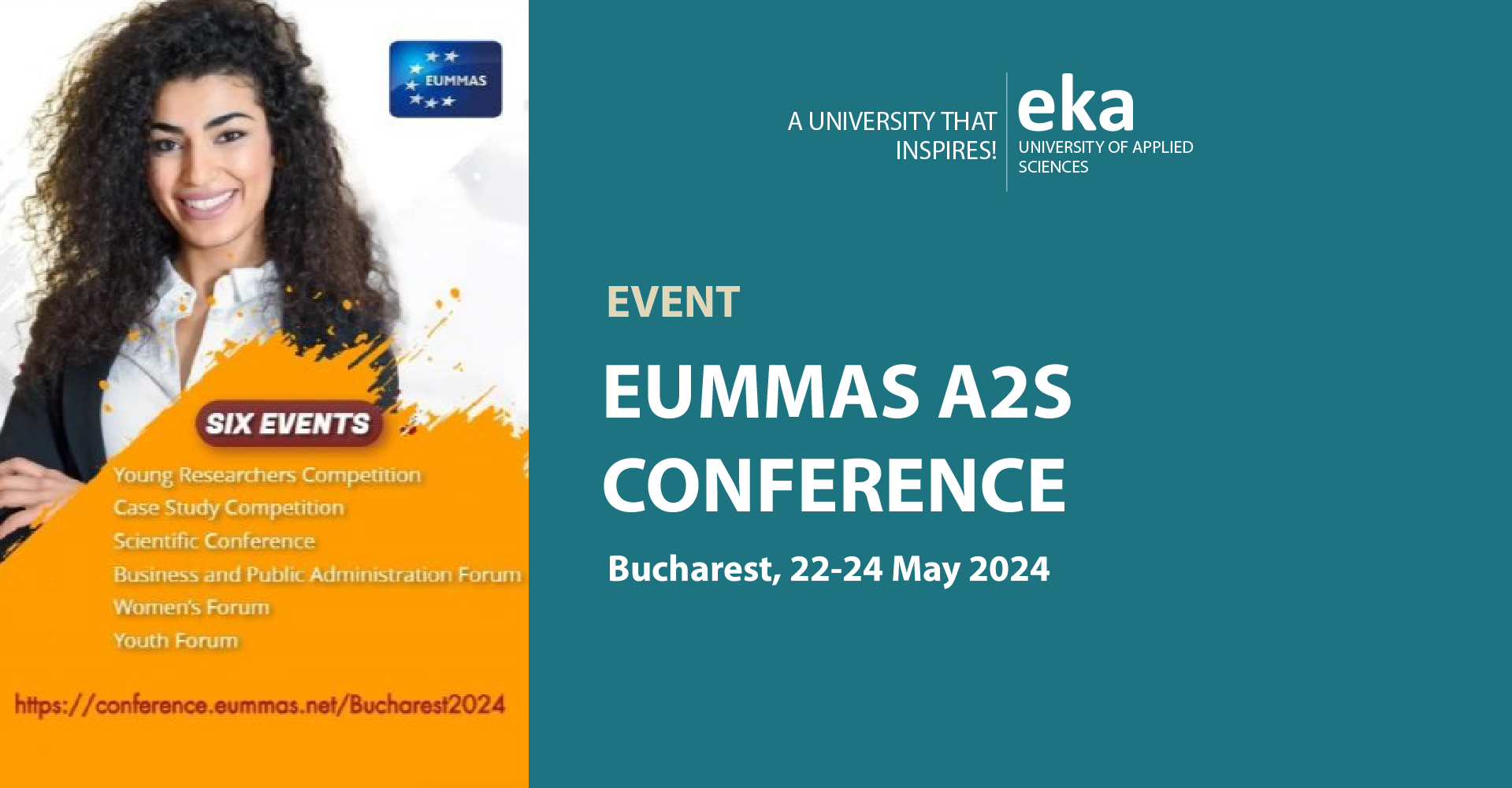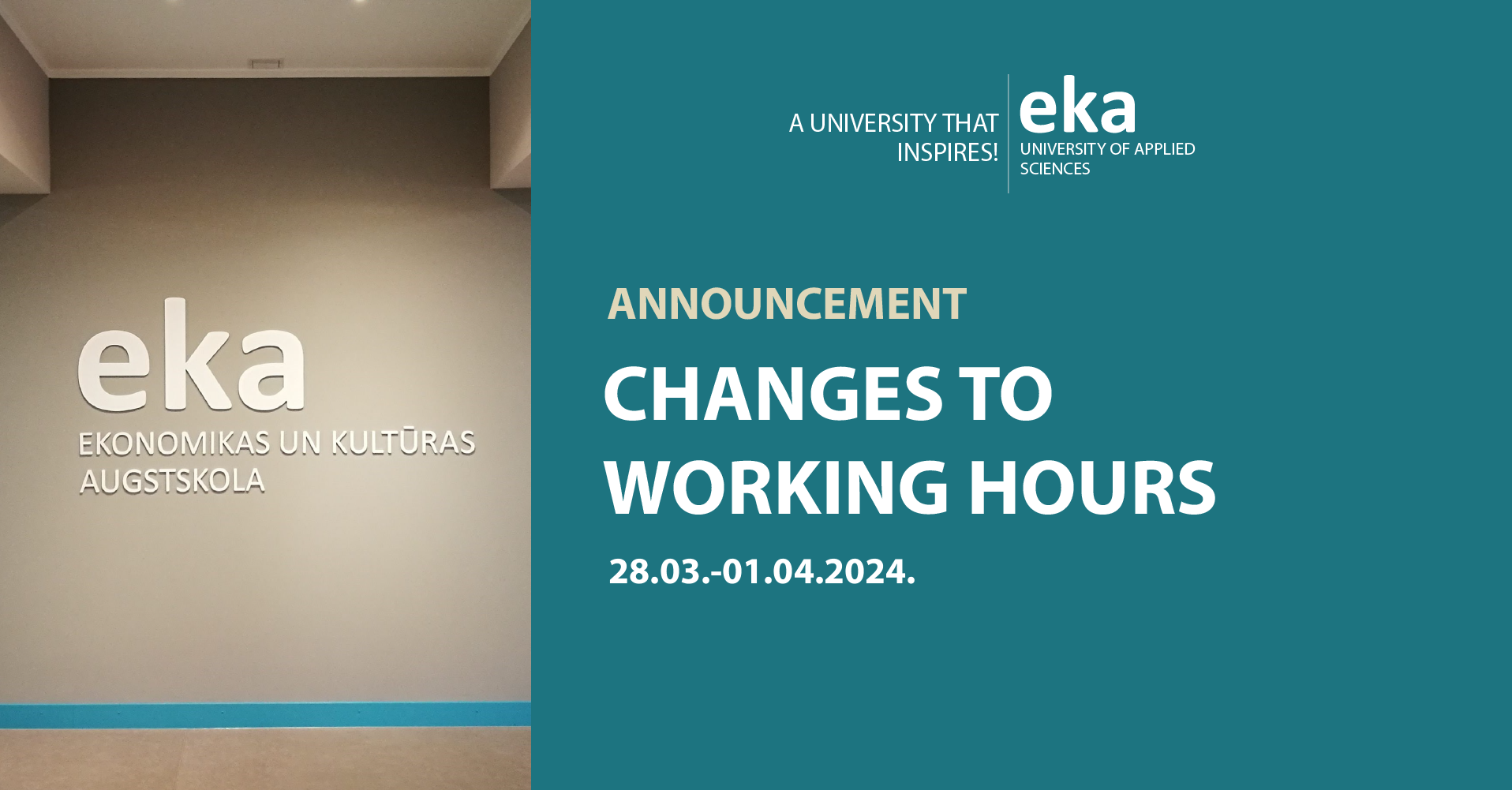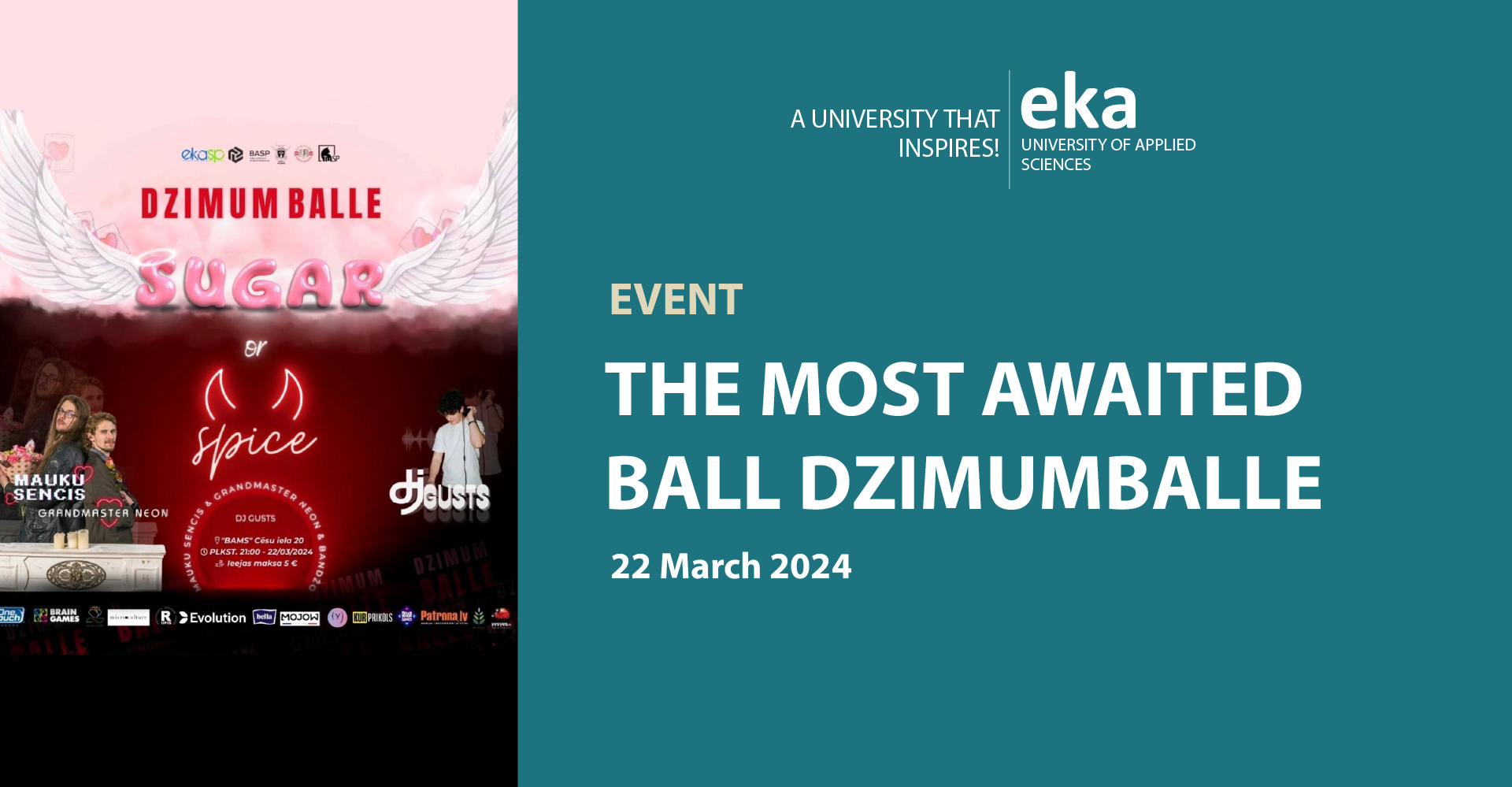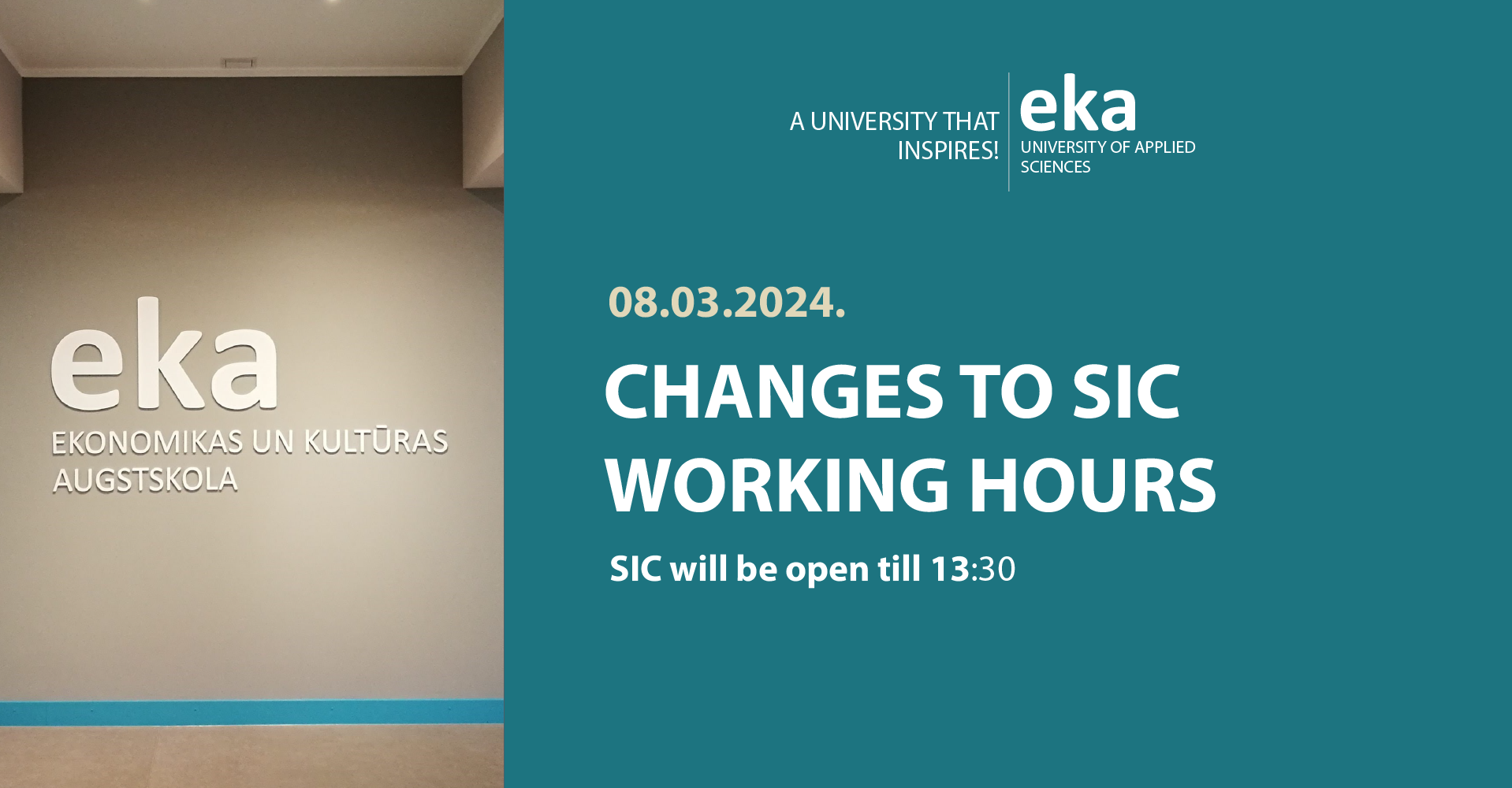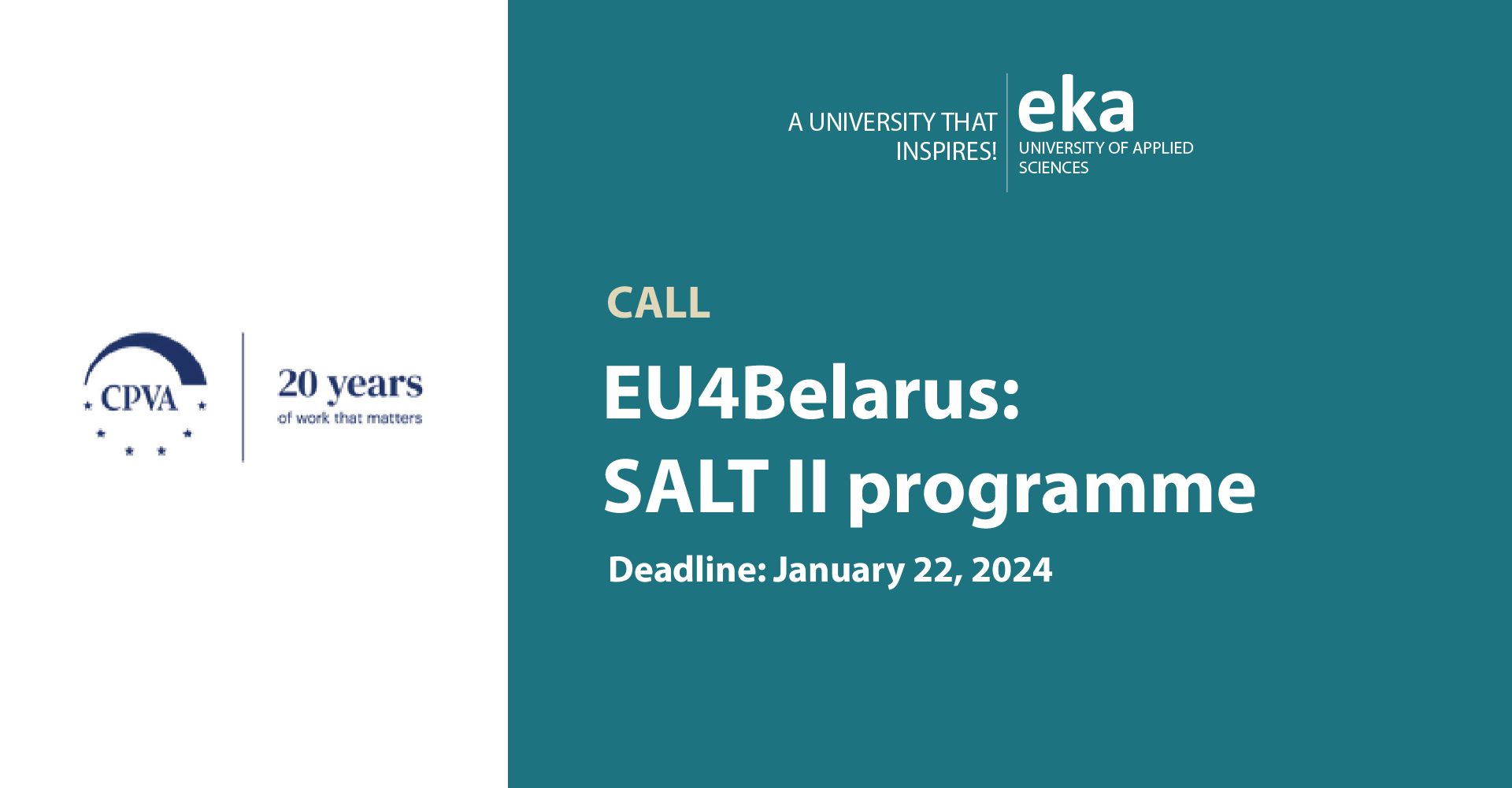
ERASMUS+ PROGRAMME
Erasmus+ is the EU Programme in the fields of education, training, youth and sport. For nearly 30 years, the EU has funded the Erasmus programme, which has enabled over three million European students to spend part of their studies at another higher education institution or with an organisation in Europe. Erasmus+ brings such opportunities to all - students, staff, trainees, teachers, volunteers and more.
More detailed information is available at:
Erasmus+ Charter for 2021-2027 has been granted to The EKA University of Applied Sciences (EKA). EKA has actively participated in the previous programme Erasmus and now it continues its international activities within and outside the new Erasmus+ programme.
- The EKA University of Applied Sciences Erasmus+ CHARTER
- The EKA University of Applied Sciences Erasmus+ partner institutions
The procedure for organizing international mobility within the Erasmus+ program is determined by the Erasmus+ Regulations.
Contact Information:
Marina Tihomirova
Institutional Erasmus+ coordinator
Room 413 "Bosses" floor
erasmus@eka.edu.lv, +371 24429068
Erasmus Policy Statement
STRATEGY OF INTERNATIONALISATION
Internationalization is an integral part of EKA Development strategy. Internationalization and Strategic partnership are two of six priority directions for EKA activities. In turn, participation in Erasmus+ Programme is a crucially important prerequisite for successful implementation of EKA upcoming Internationalization and Modernization Strategy 2021-2023 (EKA-IMS2023). EKA goals that could be achieved through participation in Erasmus Programme are stated in EKA-IMS2023 and they are aligned with Programme’s goals. The goals are defined within priorities:
1. improvement of international experience of EKA students and staff
2. creation of international environment at EKA/ “Internationalization at home”
3. development of intercultural, social and civic competences of EKA students and staff
4. internationalization and modernization of curricula
5. EKA international profile and recognition
6. international cooperation in academic, research and creative activities.
GEOGRAPHICAL AREAS
Within Erasmus+ KA1 action the cooperation will be maintained with the HEIs from Programme and Partner countries. In the past, EKA has established a partnership with cooperation agreements with 67 higher educational institutions from 18 European countries, including EU15 countries, new member states, Macedonia and Turkey. Besides, EKA cooperates with HEIs from Russia, Ukraine, Kazakhstan, USA, South Africa.
The goal for the next period is to strengthen the cooperation with existing partners and to expand the network, paying attention to geographical expansion. Our priority regions now are Europe, Asia, Africa and North America. This choice is reasoned by the existing successful partnership in these regions. But it is still rather limited. We plan to work actively with Partner countries. Now we have KA107 project in progress with Kazan Technical University (Russia) and Cape Peninsula Technical University (South Africa). Our prospective partners for the nearest future are Sumy State University (Ukraine) and Walsh College (USA). Besides, EKA has very few or no partners from some European countries. For instance, in 2019 we started a collaboration with HEIs from Portugal (no agreements before).
PROJECT COOPERATION
EKA plans to establish new collaboration through participation in projects and conducting mutual research activities.
EKA is experienced in Strategic Partnerships (4 successfully implemented KA202 and KA203 projects in 2015-2020). Now, EKA is ready to submit own project proposals and perform also a coordinator’s role. Capacity-building projects is a new field for EKA (1st project started in 2019), but considering our intention is to expand the network outside Europe, it is a great opportunity to find new partners and establish a sustainable collaboration.
EKAs intention is to establish cooperation not only with HEIs, but also with professional organisations and networks. In 2019 EKA started active communication process with DLearn (European Digital Learning Network) and with their support new project proposals were submitted (within the programme “Erasmus+ Knowledge Alliance” and “Strategic Partnerships”).
EXPECTED IMPACT FROM PARTICIPATION IN ERASMUS+ PROGRAMME
Participation in Erasmus programme will help to provide students and staff with the opportunity to master their skills demanded internationally, thus enhancing their competitiveness in Latvia and abroad, by promoting their participation in international mobility, as well as by maintaining a multicultural environment at EKA. Studying abroad and getting benefits from “Internationalization at home” is a pre-requisite to improve language skills and acquire new knowledge about European culture and its diversity (priorities of the European Education Area by 2025).
EKA participation in the Programme will contribute to modernizing of EKA through collecting new teaching experience and acquiring knowledge about innovative teaching methods from foreign partners. In the result, EKA can provide opportunities for students to acquire advanced transversal skills and key competencies to prepare them from highly competitive multicultural job environment.
Erasmus digitalization will encourage faster and qualitative digital transformation of EKA. Digitalization of Erasmus procedures and EKA provided flexible study forms will create an environment adapted for participants from disadvantaged groups (people with disabilities or from lower social-economic backgrounds), that is also a priority of the European Education Area by 2025.
STUDENTS outgoing for Studies
GENERAL INFORMATION
CONDITIONS
To study abroad with Erasmus+:
- You must be registered as a student in The EKA University of Applied Sciences(EKA). For students in the first cycle (Bachelor degree), you need to be at least in the second year of your studies;
- You must fulfil all academic and financial obligations with The EKA University of Applied Sciences;
- Your period of study abroad must be relevant for your degree-related learning and personal development needs, and be part of the study programme that you are following;
- Your home institution and the receiving institution must have an inter-institutional agreement between them for you to study there with Erasmus+ ;
DURATION
Your study period abroad can last from a minimum of 3 months (or 1 academic term or trimester) to a maximum of 1 study semester.
You can benefit of an exchange abroad with Erasmus+ multiple times, either as a student or as a trainee, but your total time abroad (study abroad periods included) may not exceed 12 months within one cycle of study.
Cycle" refers to the level of study as defined by the European Qualifications Framework (EQF):
- First cycle (Bachelor or equivalent) EQF – 5/6;
- Second cycle (Master or equivalent) EQF 7;
- Third cycle (Doctoral or equivalent) EQF 8;
It is possible to apply for Erasmus+ twice a year – in October for the spring semester and in March for autumn semester.
European Credit Transfer and Accumulation System (ECTS) is a standard for comparing the study attainment and performance of students of higher education across the European Union and other collaborating European countries. Transfer of Latvian credits into ECTS requires multiplication by a factor of 1.5. One Latvian credit point (or 1.5 ECTS) is defined as a one-week full-time study workload, i.e. 40 student work hours. An average workload of a full-time student is 40 credits (60 ECTS) per academic year – 20 credits (30 ECTS) per semester.
As an Erasmus+ student, you will be exempted from fees for tuition, registration, examinations, and charges for access to laboratories or libraries at the receiving institution, but during the stay abroad student has to make a regular payment for studies at EKA.
Please note term papers have to be turned in at EKA before or after the mobility without any tuition fee.
ERASMUS+ SCHOLARSHIP
Erasmus+ grant amounts per destination country. Scholarship rates may vary depending on the funding of the European Commission.
The scholarship does not cover all the costs of study or internship abroad.
Additional funding you can apply for:
- Sustainable travel – Green travel (one-off payment of 50 EUR). You can apply for an additional grant of EUR 50 if you choose to travel by train, bus or carpool (shared by at least one more mobility student).
- The Erasmus+ fixed grant rate can be increased by 250 EUR/month* for mobility participants with fewer opportunities. EKA has set support for students with fewer opportunities that meet one of the following criteria:
*disability (physical disorders, mental disorder, intellectual or sensory impairment)
*health problems preventing participation in the programme (if student has additional medical costs during the mobility);
*cultural differences (re-emigrant (one has lived outside of Latvia for at least 3 years without interruption and has returned to Latvia in the last two years); student with refugee status; representative from ethnic group: Roma);
*social barriers (student is up to 23 years old (including) and meets one of the following criteria: student orphan or left without parental care; student has lived or is currently living in a nursing facility; student from a multi-child family (there are at least 2 dependent children in a family apart from a student);
*economic barriers (low-income family status; student has at least one dependent child (up to 13 years (including)).
* EKA is entitled to request an official document confirming the student′s compliance with the specified criterion. If applications exceed the available budget, the EKA reserves the right to suspend the application immediately, to alter the criteria for the application or to reject the application.
SELECTION CRITERIONS:
- Average grade for the previous study semester and study period;
- Foreign language skills (grades for English courses + interview);
- Student motivation (letter of motivation + interview);
- Student activity in the University;
STAGES OF MOBILITY
BEFORE THE MOBILITY
Application:
- Fill in Application form for studies;
- Write your letter of motivation;
- To apply, please submit the Application documents (Application form and motivation letter) to your Institutional Erasmus + Coordinator electronically erasmus@eka.edu.lv or in person (Room 413 "Bosses" floor)
During the 1st phase of competition applicant’s conformity to criterions of competition and academic achievements will be evaluated. Applicants with highest average grades will be admitted for the 2nd phase.
The 2nd phase of the competition is an interview in English.
Erasmus+ coordinator shall submit the decision of the Selection Committee with the list of students nominated for the Erasmus+ programme. Erasmus+ coordinator will do the official nomination to the chosen partner university.
Please note that the nomination does not guarantee Erasmus+ studies yet. After the nomination student has to wait for an instruction sent by the chosen partner university for a successfull Application procedure at the respective university.
After the interview (if you are accepted as an Erasmus+ programme participant):
- Checklist of before mobility for studies documents;
- OLA (Online Learning Agreement);
- Online Language Support (OLS)
 Please use your academic credentials (eduGAIN), unique email address ms00003@eka.edu.lv to access the platforms. Do not use gmail and other alternative options to log in. You have to sign in only with MyAcademicID.
Please use your academic credentials (eduGAIN), unique email address ms00003@eka.edu.lv to access the platforms. Do not use gmail and other alternative options to log in. You have to sign in only with MyAcademicID.
EKA email for AcademicID:
How to Use EKA AcademicID:
Before the beginning of the mobility you and EKA sign a Grant Agreement for Erasmus+ Studies.
Learning Agreement for Studies guidelines
DURING THE MOBILITY
In case if some of the selected courses have to be changed:
If you need to make changes to your OLA after it has been signed by all parties, you can log in and do so. Once all changes are complete the documents need to be signed again.
Please note the document has to be signed by the sending and the receiving institution no later than one month after the beginning of your mobility!
AFTER THE MOBILITY
Documents from the receiving institution (university abroad):
- OLA (Online Learning Agreement);
- Transcript of records with all subjects, received credit points and marks (courses have to be the same as written in you Learning Agreement before and during the mobility parts);
- Certificate of Attendance with the first and the last day of your mobility;
The dates have to be the same as is written in your Financial Agreement!
Documents to be filled by the participant:
- Submit a contribution (EUSurvey) - online report (the access rights to this survey form will be sent to the Participant’s email after completion of their mobility).
- Your Erasmus+ story in Word format with photos;
Guidelines for the Erasmus+ study mobility success story
Find out more from your Erasmus+ coordinator erasmus@eka.edu.lv, +371 24429068.
STUDENTS outgoing for Traineeship
GENERAL INFORMATION
CONDITIONS
To study abroad with Erasmus+:
- You must be registered as a student in The EKA University of Applied Sciences (EKA);
- You must fulfill all academic and financial obligations with The EKA University of Applied Sciences;
- Your traineeship must be relevant for your degree-related learning and personal development needs and, wherever possible, be integrated in your study programme;
- You may carry out a traineeship at any organisation in an Erasmus+ Programme Country (with the exception of EU institutions, bodies and agencies);
DURATION
Your traineeship abroad can last from a minimum of 2 months to a maximum of 12 months.
You can benefit of an exchange abroad with Erasmus+ multiple times, either as a student or as a trainee, but your total time abroad (study abroad periods included) may not exceed 12 months within one cycle of study.
"Cycle" refers to the level of study as defined by the European Qualifications Framework (EQF):
- First cycle (Bachelor or equivalent) EQF 5/6
- Second cycle (Master or equivalent) EQF 7
- Third cycle (Doctoral or equivalent) EQF 8
You can also go for a traineeship abroad as a recent graduate. In this case, your traineeship must occur within one year of your graduation and you must apply while still being enrolled in your higher education institution.
It is possible to apply for Erasmus+ twice a year – in October for spring semester and in March for autumn semester.
ERASMUS+ SCHOLARSHIP
Erasmus+ grant amounts per destination country. Scholarship rates may vary depending on the funding of the European Commission.
The scholarship does not cover all the costs of study or internship abroad.
Additional funding you can apply for:
- Sustainable travel – Green travel (one-off payment of 50 EUR). You can apply for an additional grant of EUR 50 if you choose to travel by train, bus or carpool (shared by at least one more mobility student).
- The Erasmus+ fixed grant rate can be increased by 250 EUR/month* for mobility participants with fewer opportunities. EKA has set support for students with fewer opportunities that meet one of the following criteria:
*disability (physical disorders, mental disorder, intellectual or sensory impairment)
*health problems preventing participation in the programme (if student has additional medical costs during the mobility);
*cultural differences (re-emigrant (one has lived outside of Latvia for at least 3 years without interruption and has returned to Latvia in the last two years); student with refugee status; representative from ethnic group: Roma);
*social barriers (student is up to 23 years old (including) and meets one of the following criteria: student orphan or left without parental care; student has lived or is currently living in a nursing facility; student from a multi-child family (there are at least 2 dependent children in a family apart from a student);
*economic barriers (low-income family status; student has at least one dependent child (up to 13 years (including)).
* EKA is entitled to request an official document confirming the student′s compliance with the specified criterion. If applications exceed the available budget, the EKA reserves the right to suspend the application immediately, to alter the criteria for the application or to reject the application.
SELECTION CRITERIONS:
- Average grade for the previous study semester and study period;
- Foreign language skills (grades for English courses + interview);
- Student motivation (letter of motivation + interview);
- Student activity in the University;
STAGES OF MOBILITY
BEFORETHE MOBILITY
Application:
- Fill in Application form for traineeship;
- Write your letter of motivation;
- To apply, please submit the Application documents (Application form and motivation letter) to your Institutional Erasmus + Coordinator electronically erasmus@eka.edu.lv or in person (Room 413 "Bosses" floor)
During the 1st phase of competition applicant’s conformity to criterions of competition and academic achievements will be evaluated. Applicants with highest average grades will be admitted for the 2nd phase.
The 2nd phase of the competition is an interview in English.
Erasmus+ coordinator shall submit the decision of the Selection Committee with the list of students nominated for the Erasmus+ programme. Erasmus+ coordinator will do the official nomination to the chosen partner university.
Please note that the nomination does not guarantee Erasmus+ studies yet. After the nomination student has to wait for an instruction sent by the chosen partner university for a successfull Application procedure at the respective university.
After the interview (if you are accepted as an Erasmus+ programme participant):
- Checklist of before mobility for traineeship documents;
- Learning Agreement for Traineeship “Before the Mobility” part;
- Europass Mobility certificate;
- Online Language Support (OLS)
 Please use your academic credentials (eduGAIN), unique email address ms00003@eka.edu.lv to access the platforms. Do not use gmail and other alternative options to log in. You have to sign in only with MyAcademicID.
Please use your academic credentials (eduGAIN), unique email address ms00003@eka.edu.lv to access the platforms. Do not use gmail and other alternative options to log in. You have to sign in only with MyAcademicID.
EKA email for AcademicID:
How to Use EKA AcademicID:
Before the beginning of the mobility you and EKA sign a Grant Agreement for Erasmus+ Traineeships.
DURING THE MOBILITY
In a case of any changes:
- Fill in Learning Agreement for Traineeship “During the Mobility” part;
Please note the document has to be signed by the sending and the receiving institution no later than one month after the beginning of your mobility!
AFTER THE MOBILITY
Documents from the receiving organisation/enterprise:
- Learning agreement for Traineeship “After the Mobility” part;
- Trainee Reference;
- Europass Mobility certificate “After the Mobility” part;
The dates have to be the same as is written in your Financial Agreement!
Documents to be filled by the participant:
- Submit a contribution (EUSurvey) - online report (the access rights to this survey form will be sent to the Participant’s email after completion of their mobility).
- Your Erasmus+ story in Word format with photos;
Guidelines for the Erasmus+ traineeship mobility success story
Guidlines on how to use the Learning Agreement for Traineeships
Find out more from your Erasmus+ coordinator erasmus@eka.edu.lv, +371 24429068
STUDENTS incoming for Studies
You are very welcome at the EKA University of Applied Sciences!
We do hope that the information provided here will help you find answers to your questions. If you need any further advice or assistance, please do not hesitate to contact ERASMUS+ coordinator erasmus@eka.edu.lv.
We wish you a lot of new and enjoyable experience while studying at the EKA University of Applied Sciences!
APPLICATION DOCUMENTS
After you are nominated by your home university, incoming Erasmus+ students have to send the following documents to the EKA University of Applied Sciences(EKA) via email erasmus@eka.edu.lv:
- Application Form;
- OLA (Online Learning Agreement);
- Transcript of Records;
- Copy of passport (ID card);
APPLICATION DEADLINES
For fall (autumn) semester - May 31
For spring semester – December 15
ACADEMIC CALENDAR
|
|
Autumn semester |
Spring semester |
|
Study weeks |
September 1 – Christmas |
1st/2nd week of February – end of May |
|
Exam period |
January |
June |
2023/2024 Academic Year Semester & Important dates
- Autumn semester 2023 dates: Friday 1 September - Sunday 28 January 2024 for all incoming students
- Christmas holidays 23.12.2023.– 01.01.2024.
- Exam dates: 02.01.2024.- 28.01.2024.
- Spring semester 2024 dates: Monday 29 January - Thursday 20 June 2024 for all incoming students.
- Easter holidays 29.03.2024.– 01.04.2024.
- Exam dates: 20.05.2024.- 20.06.2024.
COURSE CATALOGUE AND GRADING SYSTEM
Please find attached below EKA Course Catalogue with courses offered for international students in English.
EKA uses Latvian credit point system that is compatible to ECTS. Transfer of Latvian credits into ECTS requires multiplication by a factor of 1.5. One Latvian credit point (or 1.5 ECTS) is defined as a one-week full-time study workload, i.e. 40 student work hours. An average workload of a full-time student is 40 credits (60 ECTS) per academic year – 20 credits (30 ECTS) per semester.
Grading system in Latvian higher education institutions
The 10 point grading system is used for evaluating students’ learning achievements.
|
Achievement level |
Grade |
Meaning |
|
|
very high |
10 |
izcili (with distinction) |
A |
|
very high |
9 |
teicami (excellent) |
A |
|
high |
8 |
ļoti labi (very good) |
B |
|
high |
7 |
labi (good) |
C |
|
medium |
6 |
gandrīz labi (almost good) |
D |
|
medium |
5 |
viduvēji (satisfactory) |
E |
|
medium |
4 |
gandrīz viduvēji (almost satisfactory) |
E/FX |
|
low |
3,2,1 |
negatīvs vērtējums (unsatisfactory) |
Fail |
ACCOMMODATION
Information about accommodation in Riga is available here: www.augstskola.lv/?parent=93&lng=eng
ADDITIONAL INFORMATION
ERASMUS exchange students are very welcome to join the activities organized by the University and its Students Council, as well as Latvian “Erasmus students Network” www.facebook.com/ESN.Riga; www.esn.lv;
Information on VISA and residence permits:
Information on VISA and residence permits is available at the home page of The Office of Citizenship and Migration Affairs: http://www.pmlp.gov.lv/en/home/services/visas-and-invitations/ and http://www.pmlp.gov.lv/en/home/services/residence-permits/.
If you need any further information or assistance regarding insurance or housing issues, please contact EKA Erasmus coordinator via email erasmus@eka.edu.lv
STAFF outgoing
TEACHING
With Erasmus+, opportunities are available to spend time teaching at an education institution abroad.
These opportunities are available to both staff working in the education sector and to individuals in businesses invited to share their knowledge of a given sector, subject or issue to students.
Opportunities to teach abroad with Erasmus+ are available in education institutions operating at all levels.
TRAINING
With Erasmus+, training opportunities are available to staff working in education, both in teaching and non-teaching capacities.
Training periods abroad can consist of job shadowing, observation periods, professional development courses or specific competence-building events.
Erasmus+ supports training both at education institutions and at relevant organisations operating outside the sector.
DURATION
A teaching/training period between two Programme countries must last a minimum of 2 days and a maximum of 2 months. This excludes travelling time.
During your stay abroad, the teaching activity must comprise a minimum of 8 hours per week (or any shorter period of stay) of actual teaching time.
STAGES OF MOBILITY
BEFORE THE MOBILITY
To apply for Erasmus+ staff teaching/training mobility you have to fill in the Application form.
If you are going to Staff Teaching mobility check whether EKA and the receiving institution have signed an inter-institutional agreement!
Once you are accepted as a participant, you have to provide EKA a letter of acceptance from the receiving institution with the exact dates and the main goals of your mobility.
Before beginning your teaching/training period, you, EKA and the receiving institution sign a Mobility Agreement for Teaching or Training. This document sets out your learning goals, rights and responsibilities and also how the teaching/training period will be recognised.
Before the beginning of the mobility, you and EKA sign a Grant Agreement for Erasmus+ staff mobility for Teaching/Training.
AFTER THE MOBILITY
No later than one week after the end of the mobility Erasmus+ participant has to provide EKA following documents:
- The Certificate of Attendance must be submitted after it is signed and stamped by the host institution
- Travel documents (plane tickets, boarding passes, hotel invoice / receipts, other relevant documents)
- Each participant of the mobility is obliged to share examples of good practices and submit Erasmus story
Guidelines for the Erasmus+ Staff mobility for Teaching success story
Guidelines for the Erasmus+ Staff mobility for Training success story
- Submit online EUSurvey. Participants receive a link to the EU Survey once the end date of their mobility is reached. The survey is submitted on-line. Once the survey is submitted please save your Contribution in PDF .
All the mobility participant′s report documents and the individual report (EU Survey) must indicate the same dates of the visit as are recorded in the Erasmus+ contract (funding agreement).
STAFF incoming
You are very welcome at the EKA University of Applied Sciences(EKA)!
Once you are nominated by your home institution for Erasmus+ Staff Teaching or Training Mobility, check whether EKA has an inter-institutional agreement with your home institution and please send an email to erasmus@eka.edu.lv with information about:
- The exact dates of your mobility;
- The purpose of visit (for teaching mobility list of subjects proposed for teaching);
- Brief description of your personality and professional skills;
- CV (highly recommended)
If you need any further advice or assistance, please do not hesitate to contact ERASMUS+ coordinator erasmus@eka.edu.lv.
You have an opportunity to combine your Erasmus+ Staff mobility with one of the following events organised by The EKA University of Applied Sciences:
- International Academic Week
- International Scientific Conference “Emerging Trends in Economics, Culture and Humanities (etECH)”
- Staff Training Week
For further information please contact
Dr.oec., Prof.
Jeļena Titko
Vice-Rector for Science
jelena.titko@eka.edu.lv
ERASMUS STORIES
Erasmus+ stories 2023 (staff, KA107, SSU)
Erasmus+ stories 2022 (students)
Erasmus+ stories 2021 (staff)
Erasmus+ stories 2021 (students)
Erasmus+ stories 2020 (staff)
Erasmus+ stories 2020 (students)
Erasmus+ stories 2019 (staff)
Erasmus+ stories 2019 (students)
Erasmus+ stories 2018 (staff)
Erasmus+ stories 2018 (students)
Erasmus+ stories 2017 (staff)
Erasmus+ stories 2017 (students)
ERASMUS projects results
Year 2023
2023. Erasmus+ KA131. Project 2023-1-LV01-KA131-HED-000122261
Project period: 01.06.2023.- 31.07.2025.
Planned project activities - 30 mobilities:
- Student Mobility for Studies (SMS) – 10
- Student Mobility for Traineeships (SMP) - 4
- Staff Mobility for Teaching (STA) - 8
- Staff Mobility Agreement for Training (STT) - 8
Implementation of the planned mobility activities: TBA2023.
Erasmus+ KA171. Project 2023-1-LV01-KA171-HED-000136587
Project period: 01.08.2023.- 31.07.2025.
Planned project activities - 16 mobilities:
- Staff Mobility for Teaching OUT (STA) - 8
- Staff Mobility for Teaching IN (STA) - 8
Implementation of the planned mobility activities: TBA
Year 2022
2022. Erasmus+ KA131. Project 2022-1-LV01-KA131-HED-000053315
Project period: 01.06.2022.-31.07.2024.
Planned project activities - 24 mobilities:
- Student Mobility for Studies (SMS) – 10
- Student Mobility for Traineeships (SMP) - 4
- Staff Mobility for Teaching (STA) - 5
- Staff Mobility Agreement for Training (STT) - 5
Within the framework of 2022 year project, the qualitative goals of the EKA University of Applied Sciences were achieved, and the quantitative targets were exceeded: 25 mobilities were implemented (SMS-14 (11 BIP); SMP-1, STA-5, STT-5), instead of 24 planned.
Year 2021
2021. Erasmus+ KA131. Project 2021-1-LV01-KA131-HED-000003060
Project period: 01.09.2021.-31.10.2023.
Planned project activities - 17 mobilities:
- Student Mobility for Studies (SMS)– 7
- Student Mobility for Traineeships (SMP) - 3
- Staff Mobility for Teaching (STA) - 4
- Staff Mobility Agreement for Training (STT) - 3
Within the framework of 2021 year project, the qualitative goals of the EKA University of Applied Sciences were achieved, and the quantitative targets were exceeded: 18 mobilities were implemented (SMS-5; SMP-5, STA-4, STT-4), instead of 17 planned.
Year 2020
2020. Erasmus+ KA103. Project 2020-1-LV01-KA103-077173
Project period: 01.06.2020.-30.09.2022.
Planned project activities - 24 mobilities:
- Student Mobility for Studies (SMS) – 10
- Student Mobility for Traineeships (SMP) - 4
- Staff Mobility for Teaching (STA) - 5
- Staff Mobility Agreement for Training (STT) - 5
Within the framework of 2020 year project, the qualitative goals of the EKA University of Applied Sciences were achieved, and the quantitative targets were exceeded: 25 mobilities were implemented, instead of 24 planned.
2020. Erasmus+ KA107. Project 2020-1-LV01-KA107-077246
Project period: 01.08.2020.-31.07.2023.
Planned project activities - 6 mobilities:
- Staff Mobility for Teaching OUT (STA) - 2
- Staff Mobility Agreement for Training OUT (STT) - 1
- Staff Mobility for Teaching IN (STA) - 2
- Staff Mobility Agreement for Training IN (STT) - 1
Due to the Russian invasion of Ukraine, the project was partially implemented - 2 virtual mobilities (1 outgoing, 1 incoming) and 3 incoming mobilities (2 teaching mobilities (STA) and 1 training (STT)) were implemented.



